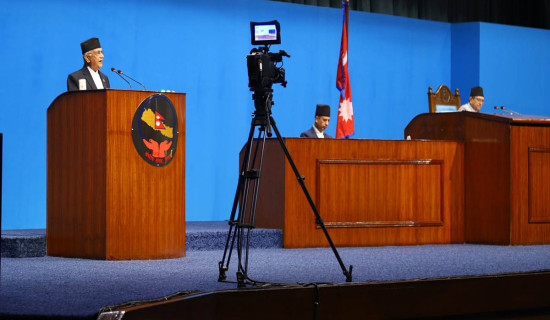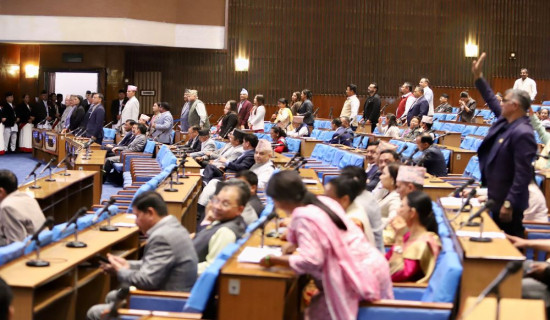- Thursday, 24 July 2025
Stakeholders committed for ensuring the meaningful youth participation for the disaster friendly and youth friendly governance
Kathmandu, July 23: Stakeholders, including the parliamentarians, have strongly emphasized the need for meaningful youth engagement in entrepreneurship, green economy, and technological literacy while involving them in climate change and social campaigns.
Chair of the Parliamentary Committee on Monitoring and Evaluation of the Implementation of the Directive Principles, Policies, and Obligations of the State, Thakur Prasad Gaire, stated that as global temperatures near a 2°C rise, glacial melting is already affecting ocean levels, making climate change and disasters a shared global concern. He emphasized the importance of raising awareness among youth, adolescents, and children about these risks, and pledged his commitment to engaging youth in the pursuit of climate justice. Highlighting the severe impact of carbon emissions from developed countries on Nepal, he noted that global warming is threatening human existence. With this he also shared that preparations are in the final phase to establish a regional parliamentary committee in Asia to foster unified efforts in addressing climate change.
MP Garima Shah warned that Nepal could soon face a food shortage, as the country has been forced to declare the Terai region drought-affected even during the monsoon and the crucial rice-planting season. She attributed the declining water table to poor development practices and stressed the need to revise the nation's development plans, policies, and strategies.
MP Sita Rana, head of the Parliamentary Forum for Child Rights, emphasized that disasters caused by climate change affect people of all age groups. She called for awareness from the local level to reduce inevitable disasters through collective action.
MP Ranju Jha emphasized the importance of youth engagement in disaster risk reduction planning and the need to promote youth-led climate action starting from the local level. She added that meaningful youth participation in policy-making is more important than simply having large numbers of youth in various programs, in fact, such participation should be made mandatory.
Climate researcher Amrit Devkota presented a paper on the overall impact of climate change and disaster risks in Nepal. He emphasized that climate change is a global issue and called for continuous advocacy at local, national, and international levels to achieve climate justice. He urged parliamentarians to make climate change and disaster risk a political priority, positioning themselves as champions of the cause. He also encouraged them to support youth-led initiatives and promote meaningful youth engagement in disaster risk reduction.
National Planning Commission Member Prakash Shrestha said that the 16th Five-Year Plan prioritizes to climate issues and emphasized that collective effort and unity are needed to implement it well.
Vice Chair of the National Youth Council, Surendra Basnet, shared that Youth Vision 2035 is currently being developed and reaffirmed the Council’s commitment to giving priority to climate change and disaster management and YFLG.
Senior Divisional Meteorologist Dr. Indira Kandel explained that rising temperatures are causing mountain melting, leading to GLOF, floods and landslides in Nepal. She noted the installation of 500 rain gauges across the country to improve disaster information sharing, along with 250 water gauges and weather radars to monitor and reduce flood-related damage. She also shared that, the data from water and rainfall measurement instruments, information is being shared with the aim of reducing the loss of lives and property due to floods in coastal areas.
Bhaba Raj Regmi, Deputy Secretary-General of the NGO Federation of Nepal, advocated for planned green economy programs to create employment for youth within the country.
Bimala Aryal, Mayor of Sunwal Municipality, shared that Sunwal Municipality is Nepal’s first child- friendly Local Governance and is actively conducting climate awareness campaigns that have positively influenced local youth.
All these commitments were made during a Policy Dialogue program entitled “Ensuring and Promoting Meaningful Youth Participation in Disaster Friendly and Climate responsive Governance was organized by the Jagriti Child and Youth Concern Nepal (Jcycn) in support of British Council. The event was chaired by Tilottam Poudel, president of Jcycn which was began with a welcome from British Council Country Director Rustam Modi, who shared his happiness about partnering with Jcycn to help raise awareness among young people about climate change, a challenge the whole world is facing.
MPs pledged to raise climate change and disaster-related issues in Parliament. The event also saw active participation from members of the National Youth Council, development partners, local civil society organizations, and youth climate activists.
Sabnam Sunar, a peer educator from Jcycn, added a creative touch to the program by presenting a poem on Climate Governance and Youth-Friendly Local Governance.
Paudel, President of Jcycn, shared that the organization has conducted awareness programs and training on climate change and disaster issues with youth and adolescents in Madi, Sunwal, Madhyabindu, and Tilottama municipalities with the support of funding partners UNDP, British Council, and Kanallan. He also highlighted Jcycn’s experience working with 14 local governments across all seven provinces, and its ongoing advocacy for Youth Friendly Local Governance (YFLG), Child Friendly Local Governance (CFLG), Nutrition Friendly Local Governance (NFLG), and girls’ empowerment.
During the event, Kala Basyal from Sunwal Municipality handed over a memorandum to MP Thakur Prasad Gaire and other participating members of parliament. The memorandum outlined 11 key points, including the need for inclusive disaster response, climate-responsive governance, meaningful youth participation, youth empowerment, allocation of resources for youth-led initiatives, and youth involvement in policy-making. In response, MPs such as Bina Lama, Tara Lama, Bijula Rayamajhi, and Ranju Kumari Jha, along with others, expressed their commitment to raising these issues in Parliament and the National Assembly, and pledged their continued support for these important matters.

.jpg)





-square-thumb.jpg)
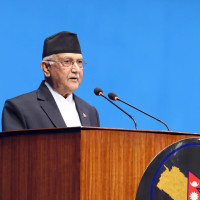
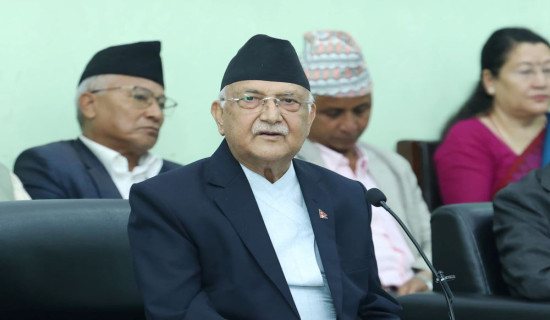
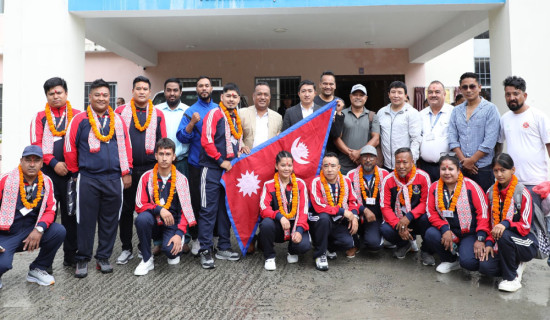
-original-thumb.jpg)
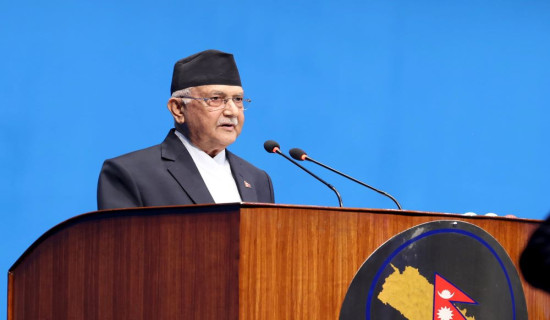
-original-thumb.jpg)
